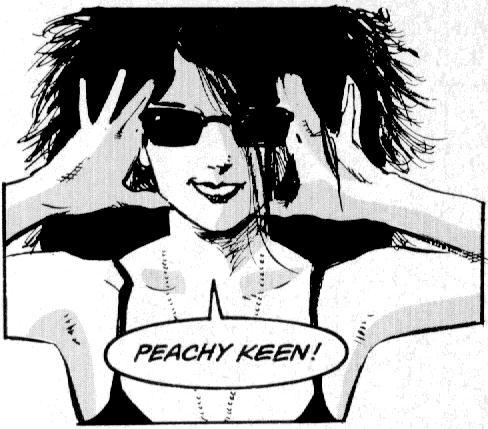What Gives Life Value: Neil Gaiman's Death and Secular Humanism

Whether one agrees or not with the above cartoon, fear of death, and desire to know if anything comes after - and if so what - is one of the primary attractions of religious belief. Most mythological and theological systems put forth some sort of theory, often one used to shape desired behavior. Atheists abound in contemporary society, by definition having to deal with their feelings towards both mortality and morality on their own terms without a set path to guide them. One possible solution to this conundrum is chosen by secular humanists, who according to http://www.secularhumanism.org/ "see themselves as undesigned, unintended beings who arose through evolution, possessing unique attributes of self-awareness and moral agency...[they] hold that ethics is consequential, to be judged by results. This is in contrast to so-called command ethics, in which right and wrong are defined in advance and attributed to divine authority...Secular humanists seek to develop and improve their ethical principles by examining the results they yield in the lives of real [people]." This essay chooses to argue that the character Death, an anthropomorphic personification of the ultimate End as portrayed in Neil Gaiman's Sandman graphic novels and various spinoff comics, is in herself an argument for the "lifestance" of secular humanism as a valid, morally sound, and spiritually fulfilling mode of thought.
Death is first introduced in the eighth issue of the original run of Sandman (Preludes and Nocturnes, "The Sound of Her Wings"), where she runs into her younger brother Dream and offers to let him tag along while she goes on her appointed rounds that afternoon. There is nothing grim about this young woman in Goth-type clothes with a distinctly sunny attitude, the Eye of Horus as part of her makeup and the Ankh around her neck both signifiers of eternity, echoing her other role in giving all living things their first breath of existence. She greets her charges with warmth and sympathy, reaching out a hand to them as she does to this man here, even as she gently refuses to let him know what happens next until he discovers it for themselves:

Click here for full image.
This scene with Death illustrates two opinions that are in keeping with secular humanism. One is that we do not need to be frightened about our inevitable demise, even if we have no real way of knowing what it will be like. Another is that saying prayers may help to comfort, but though there is no guarantee of a blissful afterlife no matter what we do, being composed and serene in the face of death is the real valuable attribute. In collecting the souls of other characters as the series goes on, Death makes such statements as "You get what anyone gets...you got a lifetime, (Brief Lives)" and "Everything ends. That's what gives it value (Death: The High Cost of Living)." As Stephen Rauch says in Neil Gaiman's Sandman and Joseph Campbell: In Search of the Modern Myth, Gaiman repeatedly underscores Death's gentleness, and eventually "we see Death as someone not to be feared, but revered as the mediator between this life and whatever lies beyond it. The point here is that death is part of the natural process, and far from being someone we should fear, it (she) can be seen as a blessed function, and a friendly face (65)." We do not need some divine power to ameliorate death, this version of Death seems to be saying, because she accepts us as we are, and we should do the same to her.

Fair Use Statement:
All quotes and images included in the essay are used for non-profit educational purposes only. I claim no rights whatsoever to them. The YouTube video embedded above was assembled by myself from a collection of both canonical and fan-created images of Death, originally for the non-profit purpose of entertainment and homage. Neil Gaiman has stated in a variety of interviews and blog posts that he considers such use fair and has no objection to them. The song "Soul Meets Body" by Death Cab for Cutie is included under YouTube terms, which by providing a "to-buy" link on the original site is considered free advertising rather than copyright infringement. The Endless own themselves.
Bibliography:
Anonymous, "RELIGION", http://pokato.net/719,RELIGION---A-really-complicated-and-illogical-way-of-saying-Im-scared-of-death
Council for Secular Humanism, http://www.secularhumanism.org/
Gaiman, Neil, The Sandman, DC Comics, New York NY, 1988-1996.
Rauch, Stephen, Neil Gaiman's The Sandman and Joseph Campbell: In Search of the Modern Myth, Holicong, PA, 2003.


